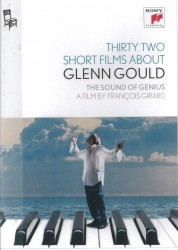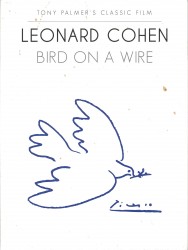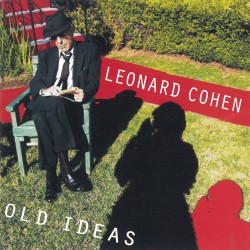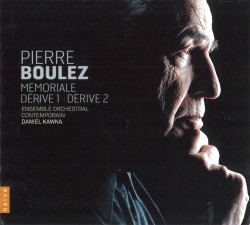 Thirty-Two Short Films about Glenn Gould was, I think, the first film I ever saw at the Toronto International Film Festival where it received a special citation back in 1993. Subtitled “The Sound of Genius” this outstanding portrait by François Girard, produced by Niv Fichman for Toronto’s Rhombus Media, went on to win four Genie Awards including Best Film and Best Director that year. It was a great pleasure to find a DVD re-issue (SONY 88691912129) in my in-box last month and to revisit Colm Feore’s canny portrayal of Gould in this docu-dramatic recreation of some of the more iconic moments of the artist’s controversial career. While much is indeed dramatic reinvention, we are also presented with commentary by some of Gould’s colleagues including film maker and violinist Bruno Monsaingeon (who is also seen in a performance of Gould’s String Quartet Op.1), Yehudi Menuhin and CBC broadcaster Margaret Pascu among others. Loosely structured on Bach’s Goldberg Variations, we are presented with a series of vignettes featuring Gould in monologue, in dialogue with himself and on occasion in interaction with others. Feore carries the bulk of the performance but there are a few supporting actors including a cameo by screenplay co-writer Don McKellar. Some of the variations involve no commentary, combining music with film montage and in one case an animation sequence by Norman McLaren. If you missed this in the theatre first time around I highly recommend you catch it on DVD now. I only wonder why it has taken two decades to bring it to the home market.
Thirty-Two Short Films about Glenn Gould was, I think, the first film I ever saw at the Toronto International Film Festival where it received a special citation back in 1993. Subtitled “The Sound of Genius” this outstanding portrait by François Girard, produced by Niv Fichman for Toronto’s Rhombus Media, went on to win four Genie Awards including Best Film and Best Director that year. It was a great pleasure to find a DVD re-issue (SONY 88691912129) in my in-box last month and to revisit Colm Feore’s canny portrayal of Gould in this docu-dramatic recreation of some of the more iconic moments of the artist’s controversial career. While much is indeed dramatic reinvention, we are also presented with commentary by some of Gould’s colleagues including film maker and violinist Bruno Monsaingeon (who is also seen in a performance of Gould’s String Quartet Op.1), Yehudi Menuhin and CBC broadcaster Margaret Pascu among others. Loosely structured on Bach’s Goldberg Variations, we are presented with a series of vignettes featuring Gould in monologue, in dialogue with himself and on occasion in interaction with others. Feore carries the bulk of the performance but there are a few supporting actors including a cameo by screenplay co-writer Don McKellar. Some of the variations involve no commentary, combining music with film montage and in one case an animation sequence by Norman McLaren. If you missed this in the theatre first time around I highly recommend you catch it on DVD now. I only wonder why it has taken two decades to bring it to the home market.
Gould was no stranger to the art of documentary making and some of the scenes presented in Thirty Two Short Films are adapted from his own television and radio productions. Last fall SONY released the 10 DVD set Glenn Gould on Television – The Complete CBC Broadcasts 1954-1977 (886979 52109). You can find Bruce Surtees’ review of that set in the November 2011 Old Wine in New Bottles archive on our website.
In 1990 the great violinist and pedagogue Yehudi Menuhin, mentioned above, became the second laureate of the Glenn Gould Prize, awarded every three years by the Glenn Gould Foundation in recognition of outstanding achievements in music and communication. This year the ninth iteration of the prize will be bestowed on Leonard Cohen at a concert at Massey Hall on May 14 featuring a veritable “Who’s Who” of the pop world which has been so influenced by Cohen’s output over the past half century.
 The announcement of the award prompted me to revisit a DVD that was issued in 2010 of a film by Tony Palmer entitled Leonard Cohen – Bird on a Wire (TPDVD166). This documentary was shot during Cohen’s 1972 European tour which also took him to Tel Aviv and Jerusalem. I found it very interesting to hear the then 37 year old singer talking about how some of the songs were written 10 and 15 years previously and how hard it was to continue to relate to them so many years later. I wonder what his perspective is now, 40 more years on. The film is very candid and we see some less than winning sides of the artist, baiting stage (state) security forces at a concert in Tel Aviv, petulantly refusing to return to the stage on a night when he feels there is no magic in the performance and demeaning (while seeming to reason with) disappointed fans after a concert in Berlin. It is a surprising portrait in many ways, of a successful artist in mid-career, warts and all.
The announcement of the award prompted me to revisit a DVD that was issued in 2010 of a film by Tony Palmer entitled Leonard Cohen – Bird on a Wire (TPDVD166). This documentary was shot during Cohen’s 1972 European tour which also took him to Tel Aviv and Jerusalem. I found it very interesting to hear the then 37 year old singer talking about how some of the songs were written 10 and 15 years previously and how hard it was to continue to relate to them so many years later. I wonder what his perspective is now, 40 more years on. The film is very candid and we see some less than winning sides of the artist, baiting stage (state) security forces at a concert in Tel Aviv, petulantly refusing to return to the stage on a night when he feels there is no magic in the performance and demeaning (while seeming to reason with) disappointed fans after a concert in Berlin. It is a surprising portrait in many ways, of a successful artist in mid-career, warts and all.
Tony Palmer’s film was made in 1972 and as I mentioned Cohen at that point acknowledges that the songs were written long ago. Yet seven years earlier when the National Film Board of Canada produced Ladies and Gentlemen… Mr. Leonard Cohen (all but the last six minutes of which are available for viewing on YouTube), music was incidental to his career as a poet and novelist and merited mention only in passing in that 45 minute documentary. His droll delivery from the stage however suggests Cohen could have had a career as a stand-up comic.
The most surprising aspect of this film to me was the realization that so many of the iconic songs that we know Leonard Cohen for, Hallelujah and First We Take Manhattan notwithstanding, were written as a young man and, perhaps more surprising, that the voice we never considered “good” was actually quite musical in those early years.
 Of course Cohen has had a long and successful career and in recent years has continued to release albums and tour extensively. The 2008 documentary Live in London and a tribute concert at the Montreal Jazz Festival that year are testament to his ongoing influence in the music world. Most recently Old Ideas (Columbia 88697986712) has been very well received although this critic will reserve judgement on the recent output until cover versions of the songs begin to appear. Evidently there have been 150 renditions of Hallelujah, in many different languages and genres, but I have my doubts that the new Amen will achieve such glory.
Of course Cohen has had a long and successful career and in recent years has continued to release albums and tour extensively. The 2008 documentary Live in London and a tribute concert at the Montreal Jazz Festival that year are testament to his ongoing influence in the music world. Most recently Old Ideas (Columbia 88697986712) has been very well received although this critic will reserve judgement on the recent output until cover versions of the songs begin to appear. Evidently there have been 150 renditions of Hallelujah, in many different languages and genres, but I have my doubts that the new Amen will achieve such glory.
 Another Glenn Gould Prize laureate who has caught my attention this month is Pierre Boulez who won the $50,000 award in 2002. A new recording of Mémoriale and Dérive 1 & 2 featuring Ensemble Orchestral Contemporain under founder Daniel Kawra (naïve MO 782183) presents interrelated works from the mid-1980s. The last of these has continued to occupy Boulez since its conception with the most recent revision dating from 2006; the first is based on a movement from the 1972 work … explosante-fixe … written in response to the death of Stravinsky. So in effect the pieces here reflect three and a half decades of Boulez’ compositional output.
Another Glenn Gould Prize laureate who has caught my attention this month is Pierre Boulez who won the $50,000 award in 2002. A new recording of Mémoriale and Dérive 1 & 2 featuring Ensemble Orchestral Contemporain under founder Daniel Kawra (naïve MO 782183) presents interrelated works from the mid-1980s. The last of these has continued to occupy Boulez since its conception with the most recent revision dating from 2006; the first is based on a movement from the 1972 work … explosante-fixe … written in response to the death of Stravinsky. So in effect the pieces here reflect three and a half decades of Boulez’ compositional output.
The disc seems organic in the way it progresses. It begins with Mémoriale for solo flute, two horns, three violins, two violas and cello, dedicated to the memory of Canadian flutist Lawrence Beauregard who worked closely with Boulez in the development of interactive computer/instrument interfaces at IRCAM, Mémoriale exists in two versions: with and without technology. I had to listen very carefully to this recording to realize that this is the purely acoustic rendition. The strings using metal practise mutes produce an ethereal shimmering that sounds almost electronic.
Although composed in 1984, a year earlier than Mémoriale, Dérive 1 seems to grow out of the opening piece. Only this time the strings are not muted and it is as if familiar material has been amplified, or rather magnified.
This is taken a step further in the 50 minute Dérive 2. I was surprised to realize that although using a much larger ensemble than the opening pieces, the orchestration here involves just 16 players. My initial impression was of a concerto for orchestra but the basic one per part instrumentation produces a deceptively full spectrum of sound. The addition of harp, piano, vibraphone and marimba to the bare bones ensemble contributes to the effect. I found the bassoon, English horn and clarinet cadenzas especially intriguing.
This recording will provide a good introduction to the music of one of the most important composers of our time for those not yet familiar with Boulez. It is also an important addition to the discography for those who already realize the scope of this master.
Associated with the Glenn Gould Prize is the City of Toronto award of $15,000 to a “protégé” as designated by the winner. We do not yet know who Mr. Cohen will name, but I would like to mention in passing that the most recent GGP laureate, José Antonio Abreu, picked the young Venezuelan conductor Gustavo Dudamel. Dudamel has gone on to an illustrious career at the helm of the Los Angeles Philharmonic in addition to currently serving as music director of the Gothenburg Symphony Orchestra (Sweden) and the Simón Bolívar Symphony Orchestra of Venezuela. His recording of Brahms’ Fourth Symphony with the LA Philharmonic (Deutsche Grammophon digital release 0289 477 9459 2) won the 2012 Grammy Award for Best Orchestral Performance.
We welcome your feedback and invite submissions. CDs and comments should be sent to: The WholeNote, 503–720 Bathurst St., Toronto ON M5S 2R4. We also encourage you to visit our website www.thewholenote.com where you can find added features including direct links to performers, composers and record labels, “buy buttons” for online shopping and additional, expanded and archival reviews.
—David Olds, DISCoveries Editor, discoveries@thewholenote.com



